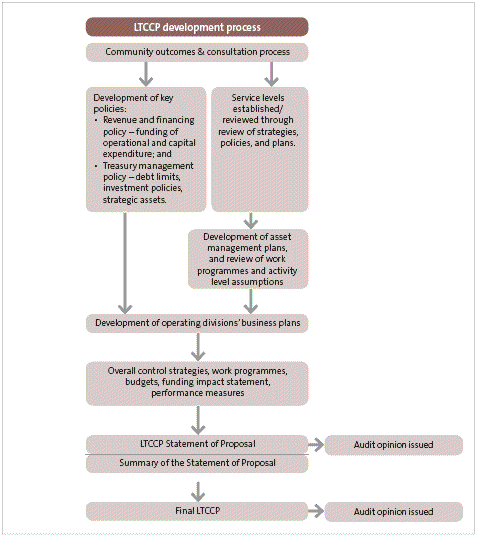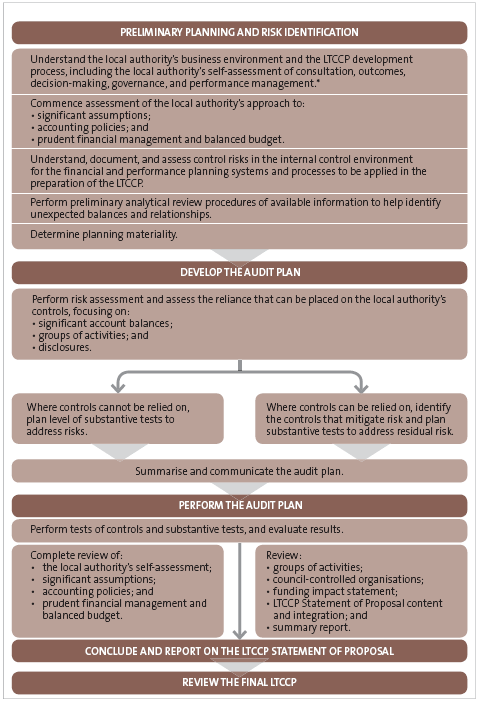Part 1: Introduction
1.1
This is our report arising from the audits of the 2006-16 Long-Term Council Community Plans (LTCCPs) prepared by local authorities.
1.2
An LTCCP is a 10-year plan. Section 93(6) of the Local Government Act 2002 (the Act) sets out its purposes, which are to:
- describe the activities of the local authority;
- describe the community outcomes of the local authority’s district or region;
- provide integrated decision-making and co-ordination of the use of the local authority’s resources;
- provide a long-term focus for the decisions and activities of the local authority;
- provide a basis for the local authority to be accountable to the community; and
- provide an opportunity for the public to participate in decision-making processes on activities to be carried out by the local authority.
1.3
There are a number of steps that a local authority must take to meet the requirements of the Act in preparing the LTCCP. These steps include consultation with the community, development of key policies and plans, and putting in place financial strategies and performance measures. Figure 1 outlines the process for preparing an LTCCP.
Figure 1
The LTCCP development process

1.4
Two key documents in the LTCCP process are the LTCCP Statement of Proposal (which includes the draft LTCCP) and the final LTCCP. Local authorities are also required to prepare a Summary of the Statement of Proposal (the LTCCP Summary) for use as a public consultation document.
1.5
Section 84(4) of the Act requires the draft LTCCP to include a report from the Auditor-General. Local authorities are also required to consult with the public on the LTCCP Statement of Proposal using the special consultative procedure outlined in sections 84(1) and 83.
1.6
Section 94(1) requires the final LTCCP (adopted after the local authority has considered the results from the consultation) to include the Auditor-General’s report.
1.7
For both the LTCCP Statement of Proposal and the final LTCCP, the Auditor-General is required to report on:
- the extent to which statutory requirements have been complied with;
- the quality of information and assumptions underlying the forecast information provided; and
- the extent to which the forecast information and proposed performance measures will provide an appropriate framework for the actual levels of service provision to be meaningfully addressed.
1.8
Under the provisions of the Act, all local authorities are required to prepare an LTCCP every three years. The full provisions of the Act on preparing LTCCPs, including their audit, came into effect for the first time for LTCCPs adopted for the period starting 1 July 2006.1
1.9
The next LTCCP audits will be required in 2009. However, the Auditor-General is also required to report on amendments that are proposed to the LTCCPs during the intervening three years for which the existing LTCCP is in force.
Purpose of this report
1.10
The purpose of this report is:
- to tell Parliament and the local government sector about matters arising from our audit of local authorities’ LTCCPs; and
- to provide comparative information on changes in the quality of information in crucial areas since the Act was passed, to allow Parliament and the local government sector to assess the effect of the LTCCP on local authority planning.
Scope of this report
1.11
This report includes:
- a separate report by external reviewers of the changes between the 2004-14 and 2006-16 LTCCPs in each of the areas of sustainable development, performance information, asset management information, and financial management strategies;
- an analysis of financial trends and issues in the 2006-16 LTCCPs;
- an analysis of common issues relating to the preparation of 2006-16 LTCCPs, including the performance management framework, asset management planning, and the financial management framework; and
- commentary on our audit opinions on the 2006-16 LTCCP Statements of Proposals and final LTCCPs.
Our auditing methodology and reporting approach
1.12
In developing our approach to the LTCCP audits, we aimed to adhere to relevant professional standards and good auditing practice. However, we recognised that preparing an LTCCP requires making informed and reasonable judgements about the future that cannot always be solely supported by facts or evidence.
1.13
We therefore took a flexible approach that attempted to recognise the reality of the context and constraints in which local authorities operate, while allowing for good practice to emerge over time within the general framework of the Act. To this extent, our methodology relied on local authorities applying, as appropriate:
- the requirements and principles of the Act (including the sustainable development principle2);
- the requirements of generally accepted accounting practice (GAAP);
- existing sector good practice (for example, National Asset Management Steering Group3 asset management guidelines); and
- good practice identified in the sector during our audit enquiries.
1.14
Our audit work focused initially on systems because we consider that a local authority’s planning systems are vital to preparing an effective LTCCP. We also doubted whether there would be enough time to complete our audit work once a LTCCP Statement of Proposal had been drafted if we were not able to rely on a local authority’s planning systems.
1.15
We considered that, by focusing on systems rather than on specific decisions or forecast amounts, we would encourage good practice and that, over time, this would give communities greater confidence in the reliability and quality of LTCCPs.
1.16
We wanted our local government sector audit service providers – Audit New Zealand, Deloitte, and Ernst & Young – to achieve maximum consistency in their approach and to minimise the effect of their audit work on local authorities’ time and resources. To achieve this:
- We moved away from competitive contracting for audits to an allocation model. This gave local authorities certainty and consistency in their audit arrangements and allowed auditors to develop expertise in the field of LTCCP and local government audits.
- We prepared a range of standard audit documentation to provide consistency and minimise duplication of audit work. This applied to our LTCCP audit methodology, as well as standard engagement arrangements and reporting documents. We also provided support and training that was shared among all our auditors.
- We provided several "checkpoints" at which audit work was centrally reviewed to confirm the consistency and fairness of our approach to each local authority.
1.17
We recognise that the LTCCP is a plan and that plans, of necessity, are not based on information that is certain. Therefore, we were not seeking to second-guess the financial and performance estimates provided by local authorities. Rather, we were seeking confidence that estimates were reasonably based.
1.18
We expected that both the draft and final LTCCPs would be based on a local authority’s best available information and best estimates. This would provide a good basis for consultation and decision-making during the preparation of the LTCCP and for subsequent decision-making and accountability to the community.
1.19
Our major focus was on the LTCCP Statement of Proposal, as this is the most important document for public consultation. Our interest in the final adopted LTCCP was primarily to ensure that changes (made through consultation) and final decisions had been appropriately reflected.
1.20
Figure 2 sets out our audit approach, which was based on the International Standard on Assurance Engagements (ISAE 3000)4 and adapted as appropriate to reflect the intentions and specific requirements of the Act. A full diagram of this methodology and an outline of our approach are available on our website at www.oag.govt.nz.
Figure 2
Summary of our LTCCP audit approach

* The self-assessment was an audit tool developed for local authorities to describe and analyse their processes and controls in the described areas.
1: Local authorities also prepared LTCCPs for the period 2003-14 or 2004-14, which allowed analysis of changes between these and the 2006-16 LTCCPs.
2: See section 14(1)(h) of the Act, which states that, in taking a sustainable development approach, a local authority should take into account (i) the social, economic, and cultural well-being of people and communities; and (ii) the need to maintain and enhance the quality of the environment; and (iii) the reasonably foreseeable needs of future generations.
3: The National Asset Management Steering Group is a non-profit industry organisation set up in 1995 to promote asset management by developing best practice guidelines and training.
4: Issued by the International Federation of Accountants (IFAC).
page top
